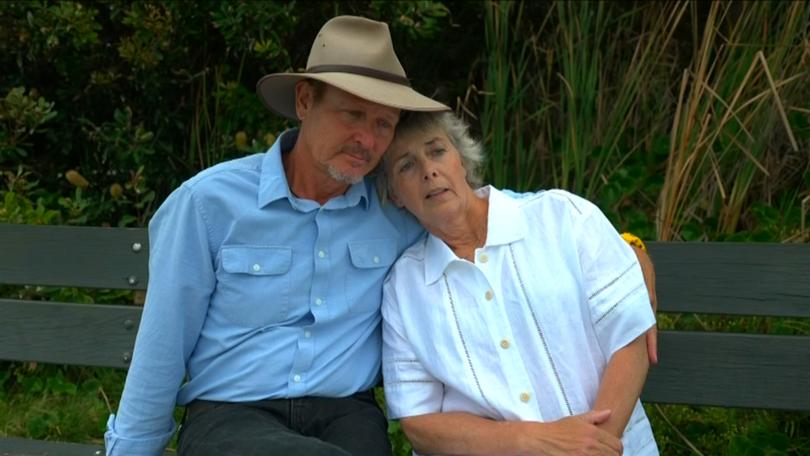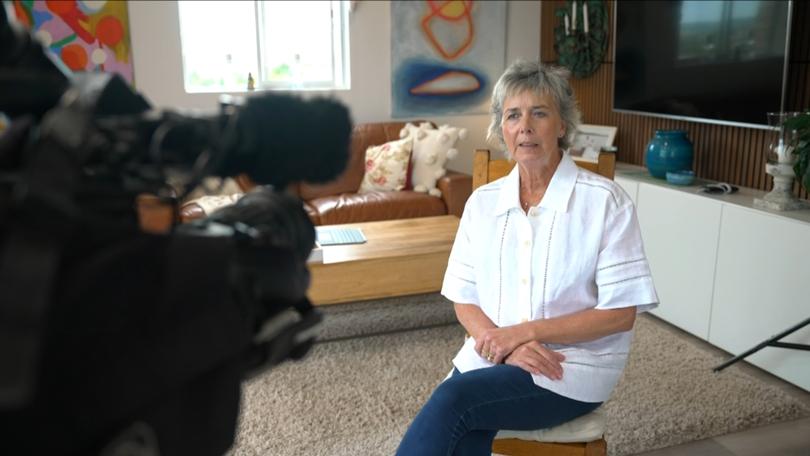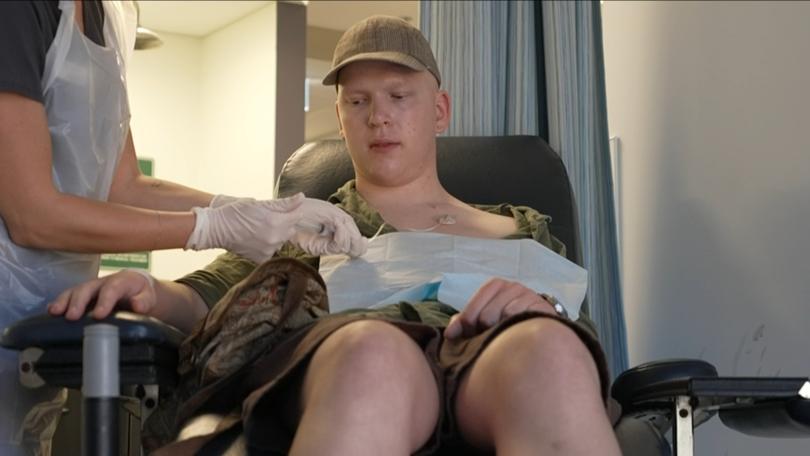Olaparib, the drug which costs either $30 or $7k a month, depending on what cancer you have
It took a news story for the Sydney mum to realise that she was paying 200 times as much as a fellow cancer sufferer for exactly the same medication.

Sydney Mum, Eva Bishop was watching a story on 7NEWS at the beginning of this year when she realised she had “the wrong cancer.”
“We’re making dinner together and all of a sudden we hear this name Olaparib come up, so we come round, we watch the television”, said Eva’s husband Peter, who felt a shiver down his spine after hearing the name of the drug his wife had been taking for four years to treat Eva’s pancreatic cancer.
The story focused on a woman suffering breast cancer who was now able to access the same drug developed by Astra Zeneca for about $30 a month under the Pharmaceutical Benefits Scheme (PBS). Despite sharing the same gene abnormality as the breast cancer patient, Eva’s pharmacy bill is 200 times greater; she pays almost $7000 a month.
Sign up to The Nightly's newsletters.
Get the first look at the digital newspaper, curated daily stories and breaking headlines delivered to your inbox.
By continuing you agree to our Terms and Privacy Policy.The couple’s costs sit at $350,000 dollars – for a PBS-approved drug.
For years, Eva thought her situation was normal: “The only time you really think (about the cost) is when the person behind you in the pharmacy queue looks at me as if I’m completely insane and I just tell them that I have no choice.”
But Peter recalls the moment the penny dropped, “She looks at me and she didn’t say, ‘I’ve got the wrong cancer’, she said ‘I’ve got the wrong EFFING cancer!’
“That’s what she said. She was dumbfounded.”
Eva doesn’t begrudge breast cancer sufferers, but she does take issue with the system that allows such injustice. A system being paraded by the Government over the last week for helping “All Australians” with $25 pharmacy scripts.
In the cruellest of ironies, Eva had a double mastectomy to avoid the very cancer that would have qualified her for fully PBS-covered use of Olaparib, a drug which has allowed her to experience unforgettable family milestones.
“I’m a grandma!” Eva told 7NEWS, “Is there anything that beats being a Grandma and a Grandpa? It’s the best thing ever, and two of our children are married!”

While the couple are awaiting reimbursement from the PBS, which has now well and truly surpassed the already unthinkable 466-day Australian average wait time for drug rebates, they lament the day in 2021 they were forced to sell their property in Kangaroo Valley.
A place they’d reared cattle, tended beehives and entertained guests; a little slice of heaven they’d worked all their lives for.
“You had to make a very quick decision because we don’t have that sort of money in the bank, we were living on a farm - we were living and producing what we could spend literally,” said Eva.
“I remember the day we had to put it on the markets and driving down the drive and you know just tears pouring down our eyes,” recalls Peter.
Despite all the physical and financial hardship, they count themselves lucky they had the farm to sell in the first place to fund Eva’s survival.
“What about the person down the road who can’t afford it,” Eva said.
There are thousands of people like Eva, the sickest of Australians who are paying hundreds of millions of dollars for PBS-approved drugs.
It’s difficult to estimate the real figure because many oncologists are reluctant to offer patients the most expensive treatments if they suspect they don’t have the means.
It wasn’t hard to find someone who can’t afford it.
While the Federal Government covered Jacques Mathot’s genomic testing for his Ewing’s’ sarcoma, the results pointed the 22-year-old in the direction of treatment which would cost $130,000.
AstraZeneca rejected Jacques’ compassionate plea, because their drug is untested on Jacque’s rare cancer, which usually forms tumours in the bones of children and young adults.
“There’s a lot of rare cancer patients out there - a lot of young cancer patients - and if everyone is prescribed to their own specific treatment that’s not covered then how can everyone find the money to pay for that,” Jaques said.
Jacques called on his community to fund the treatment. The Cooper Rice Brading Foundation contributed 35 thousand dollars, and Rare Cancers Australia gave him a platform to raise the rest.
Jacques’ father, Mark, told 7NEWS, “’It’s borderline cruel to tell somebody, ‘Hey we’ve found something, we’ve got a drug which may actually save your life as long as you can write a very big cheque’.”
The reality is the PBS is failing to keep pace with modern medicine and big pharmaceutical companies flooding the market with bespoke treatments for certain diseases, particularly rare cancers.
When you put all the rare cancer sufferers together, it’s quite clear they’re not that rare.
Meanwhile, the PBS is stuck in a twentieth century one-size-fits-all approach. It was designed to approve and list the odd new drug, not the dozens it now has to review every month.
That’s why it takes almost 500 days for a patient to get reimbursed for a drug from when the company applies for therapeutic use, to when it finally gets approved.

The process is mired in bureaucracy and has even caught the attention of US President Donald Trump, who believes the Australian system is shaving profits from American “big pharma” - for being too slow to approve new drugs.
Leading breast cancer oncologist Professor Fran Boyle described the process as “cumbersome, it’s slow”.
“And it doesn’t acknowledge that some of the people who need these drugs are going to die while they’re waiting,” he added
Professor Boyle has been campaigning for years on behalf of cancer patients who are too often forced into three sad options: going overseas for treatment, crowdfunding for expensive drugs, or dying waiting for reimbursement.
“The number of drugs and the smaller populations of people has meant the work of the PBS and medical technology experts is just exponentially increased and unfortunately what hasn’t happened is their resourcing has not increased”, says Professor Boyle, who points out that the chair of the Pharmaceutical Benefits Advisory committee does the job part-time.
“I imagine juggling that may be a challenge. Cancer patients in Australia deserve someone’s who’s committed to innovate.”
Robyn Ward has an impressive medical resume, but she has another full-time job at Monash University.
A senate estimates hearing revealed she missed her first meeting as head of the PBAC because of a prior engagement.
Senator Anne Ruston was there.
“She has a full-time job somewhere else as well as doing PBAC I think there’s some questions there,” Senator Ruston said.
“We would like to think that all of the resources that were dedicated to PBAC were full-time resources.”
Professor Ward declined to be interviewed by 7NEWS.
So did Federal Health Minister Mark Butler, who instead answered questions about the failures of the PBS during a press conference in a Priceline pharmacy in suburban Adelaide last Friday.
7NEWS took Eva Bishop’s message to him then: “Minister, could you please consider a more compassionate approach to approvals. Please don’t put the financial burden on to the patient, we’re already in so much pain”, she pleaded.
To Eva, the Minister had this to say…
“I want to get whatever treatment you are currently taking on to the PBS as quickly as possible … extraordinary medicines that frankly we wouldn’t have imagined 10 or 20 years ago … so you don’t have to pay those sorts of monies.”
There was nothing in Tuesday’s Federal Budget suggesting that’s going to happen anytime soon. There are price-capped scripts, new and approved medicines for women suffering endometriosis, but nothing for cancer sufferers being teased with the world’s most expensive and potentially life-saving treatments.
The Health Technologies Assessment is still gathering dust on Mr Butler’s desk, months after being delivered.
It outlined 50 recommendations to streamline the system. Instead of acting immediately on those, Butler assembled an advisory group, which we’ve been assured will deliver yet another report in the second half of this year.
Professor Boyle is among the oncologists who say there should be an interim cancer fund, similar to what exists in the UK to catch those patients falling through the cracks.
She also says the medical research industry can make wholesale changes too.
Professor Boyle said there are projects currently being worked on “to develop trials that include people with different kinds of cancer but who have the same genetic abnormality” to avoid more Eva Bishop situations.
Meanwhile, the cancer in Eva’s pancreas has finally found a way around the wonder drug that no doubt added precious years to her life, and she’s back on chemotherapy.
Jacques Mathot waits nervously to see whether his $130,000 drug will work, or whether he might have to raise yet more money for another round of treatment.
In a country which takes such pride in its equitable health system, there should be no such thing as ‘the wrong cancer’.
Tom Sacre is a Senior Reporter at 7NEWS
